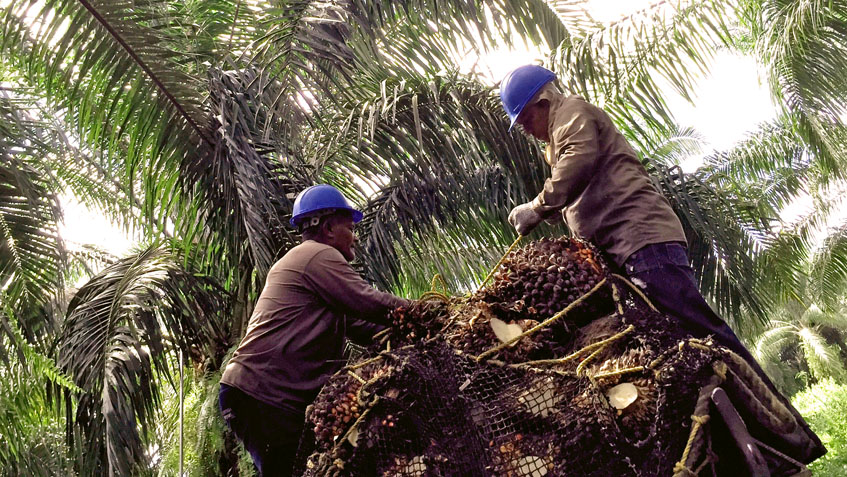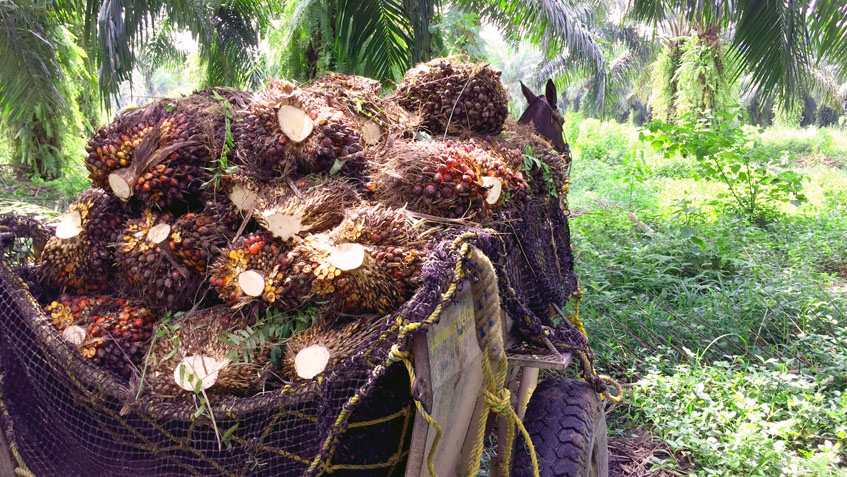Direct hiring opens up new horizons in Colombia’s palm oil sector
“Every day I cut an average of 250 bunches. An average of three tons,” says José Guarín. Using a knife attached to the end of a pole so that he can reach the fruit, he moves under the trees to the selected spot. “Being a cutter means I have to assess which bunches of fruit in a given lot are ripe for harvesting, cut them and bring them down from the palm tree for processing.”
“You have to position yourself in a safe spot, because you’re going to bring down the fronds under the bunch and then the bunch itself,” he explains. The fruit crash to the ground, where another worker picks them up and loads them onto a horse-drawn cart. Around noon it becomes too hot and the tedious task of harvesting is over for the day. The bunches of fruit are taken to where the palm oil is produced, at the other end of the plantation.
Guarín is one of the 225 employees of Palmas del Cesar S.A. who received some good news at the end of last year: under a tripartite agreement, they had been hired directly by the palm oil company after spending years being outsourced or subcontracted.
The direct hire was made possible thanks to a labour formalization agreement promoted by the Colombian Ministry of Labour following intense negotiations with the company owning the plantation and the trade union Sintrainagro, which had mobilized to bring an end to labour relations deemed “ambiguous or disguised”.
The process was supported by the ILO under a programme promoting labour formalization agreements in this part of Colombia and forming part of the Technical Cooperation Programme for the Promotion of Compliance with International Labour Standards in Colombia, which is funded by the United States Department of Labor.
Guarín is also president of SINTRATERCERIZADOS, the trade union representing outsourced workers. He lives with his wife, children, siblings and parents in San Alberto, a few kilometres from the plantation.
He explains, “For me, direct hiring is a success. Since 2006, when I started to work, I had been hired through a cooperative and other forms of subcontracting that never gave me the opportunity to join a union, I was never able to discuss my job benefits. I couldn’t talk about job security. I had no means of organizing in a way that would allow me to act in defence of my rights. Today I can say that I have joined a union and that, through the union, I can defend the rights of each and every worker.”
“You have to position yourself in a safe spot, because you’re going to bring down the fronds under the bunch and then the bunch itself,” he explains. The fruit crash to the ground, where another worker picks them up and loads them onto a horse-drawn cart. Around noon it becomes too hot and the tedious task of harvesting is over for the day. The bunches of fruit are taken to where the palm oil is produced, at the other end of the plantation.
Guarín is one of the 225 employees of Palmas del Cesar S.A. who received some good news at the end of last year: under a tripartite agreement, they had been hired directly by the palm oil company after spending years being outsourced or subcontracted.
The direct hire was made possible thanks to a labour formalization agreement promoted by the Colombian Ministry of Labour following intense negotiations with the company owning the plantation and the trade union Sintrainagro, which had mobilized to bring an end to labour relations deemed “ambiguous or disguised”.
The process was supported by the ILO under a programme promoting labour formalization agreements in this part of Colombia and forming part of the Technical Cooperation Programme for the Promotion of Compliance with International Labour Standards in Colombia, which is funded by the United States Department of Labor.
For me, labour formalization gives me the possibility to make the dreams I’ve had for so many years come true. As of today I can start to work on a life plan."
José Guarín, palm tree cutter and president of SINTRATERCERIZADOS
He explains, “For me, direct hiring is a success. Since 2006, when I started to work, I had been hired through a cooperative and other forms of subcontracting that never gave me the opportunity to join a union, I was never able to discuss my job benefits. I couldn’t talk about job security. I had no means of organizing in a way that would allow me to act in defence of my rights. Today I can say that I have joined a union and that, through the union, I can defend the rights of each and every worker.”
A major milestone
The Labour Formalization Agreement marks an important milestone in the palm oil sector, which has a long history of industrial strife. It was preceded by a three-month strike and by difficult negotiations. The company was also fined by the Ministry of Labour because of the existence of ambiguous and disguised labour relations, and this helped accelerate the negotiations.Under a labour formalization agreement, employers avoid being fined for having violated the corresponding labour standard and workers enjoy the benefits of a direct contract with their true employer.
According to Fabio González, manager of Palmas del Cesar, “Formalization is clearly an improvement, it’s an overall improvement that brings with it new challenges, of course, but the first great outcome is labour peace”.
In an interview in the company’s offices in the nearby town of Bucaramanga, González pointed out, “The negotiations weren’t easy. But we have to realize that they were difficult not only for the company, but also for the Ministry of Labour itself, for the workers, for the unions, because we had to fit a lot of things into the equation, many things had to be adjusted, every process of change generates resistance.”
For us, this was obviously a source of conflict, but the conflict ended up being part of the solution."
Fabio González, Manager, Palmas del Cesar
“In the palm oil agribusiness, workers are in a fairly precarious situation. We know that 80 per cent of palm oil workers in Colombia are outsourced in one way or another”, says René Morales, palm tree cutter and secretary of the SINTRAINAGRO Complaints and Grievance Committee.
“This is equivalent to at least 30,000 workers who are unlawfully subcontracted”, he added.
He also underscored the importance of the Palmas del Cesar Labour Formalization Agreement, not only because it guarantees job stability, but also because it promotes freedom of association.
Here in Colombia, if a worker is not hired directly, he or she can’t become a member of a trade union."
René Morales, Palm tree cutter and secretary of the SINTRAINAGRO Complaints and Grievance Committee
Government support
The Palmas del Cesar Labour Formalization Agreement was announced by the Colombian Ministry of Labour, which supported the negotiations between employers and workers.
“We’re opening the door to a new horizon for these workers, meaning formality, or direct hiring,” said the Deputy Minister for Labour Relations and Inspection, Enrique Borda.
We can therefore say that, with the direct cooperation of the ILO in this specific project, we have a success story to tell when it comes to labour formalization."
Enrique Borda, Deputy Minister for Labour Relations and Inspection
The benefits of labour formalization
What this experience has taught us is that without direct hiring there is no decent work."
Valkyrie Hanson, , ILO technical cooperation project leader
“When you have a direct contract and job stability, things change”, José Guarín said.
















